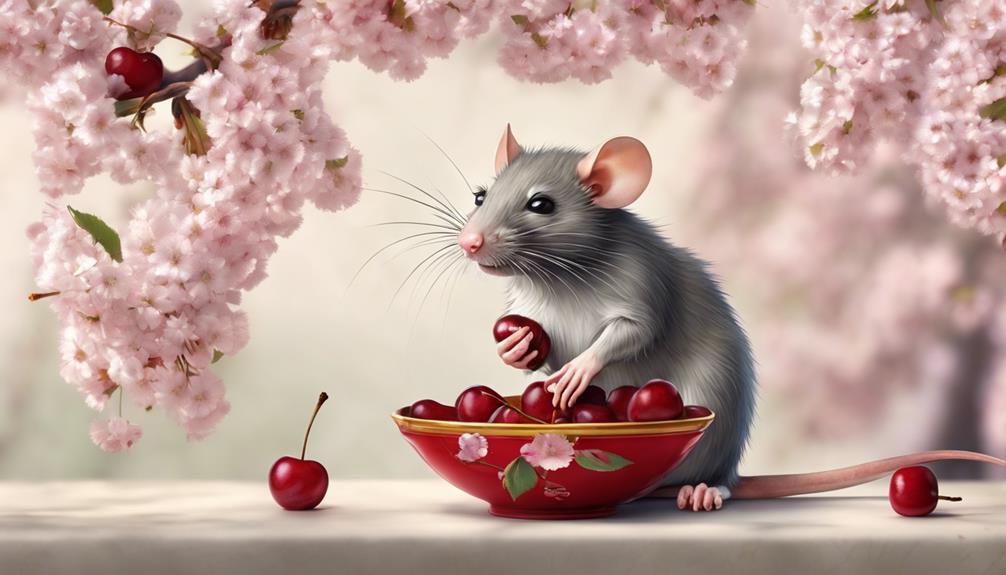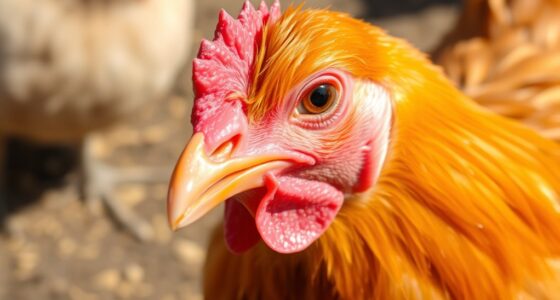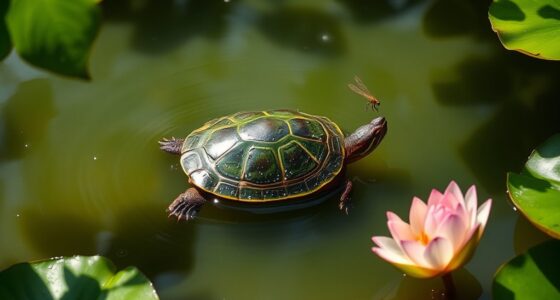Cherries can be a tasty and nutritious snack for our furry companions when given in moderation and with caution. These fruits provide essential nutrients such as vitamin C and potassium that can improve a rat’s overall health. It is important to remove the pits to avoid any risk of cyanide poisoning. Restricting the consumption of cherries to one or two per week for adult rats can help prevent problems like obesity and diabetes.
To learn more about ensuring your rats enjoy cherries safely, keep exploring the benefits and precautions associated with these delightful fruits.
Key Takeaways
- Remove cherry pits to prevent cyanide toxicity in rats.
- Limit cherry intake to one or two per week for adult rats.
- Watch for allergic reactions after feeding cherries to rats.
- Consider cherries as a treat, not a regular part of the diet.
- Cautiously incorporate cherries to minimize associated risks.
Cherry Nutritional Profile for Rats
Cherries offer a diverse nutritional profile that plays a crucial role in supporting the health and well-being of rats. These fruits are packed with essential nutrients like vitamin C, which acts as a powerful antioxidant, boosting rats' immune systems and protecting their cells from damage. Additionally, cherries are a rich source of potassium, aiding in regulating blood pressure levels in rats and supporting heart health.
Moreover, the fiber content in cherries is beneficial for rats' digestive systems, promoting healthy gut function and aiding in lowering cholesterol levels. The presence of antioxidants such as anthocyanins and quercetin further enhances the health benefits of cherries for rats, contributing to their overall wellness.
Benefits and Risks of Cherries
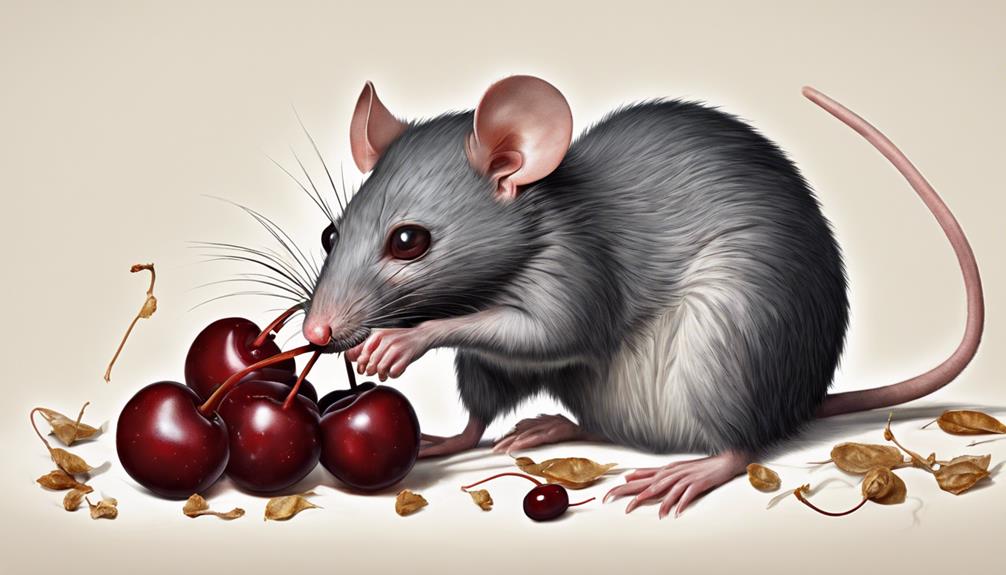
Exploring the nutritional impact of cherries on rats reveals a spectrum of benefits and risks that warrant careful consideration for their well-being. Cherries provide essential nutrients like vitamin C, potassium, and manganese, contributing to a healthy diet for rats. The antioxidants present in cherries play a crucial role in boosting rats' immune systems and reducing inflammation, promoting overall well-being.
Additionally, the fiber content in cherries aids in digestion and supports cardiovascular health in rats. However, it's vital to note that cherry pits contain cyanide, which is toxic to rats. Therefore, it's imperative to remove pits before feeding cherries to these animals. To maintain a healthy balance, it's recommended to feed adult rats cherries in moderation, limiting intake to one or two per week.
This precaution helps prevent potential risks such as weight gain and diabetes. By incorporating cherries into their diet cautiously, rats can reap the benefits of this nutritious fruit while minimizing associated dangers.
Safe Feeding Practices for Rats
When feeding rats, it's crucial to remove cherry pits to prevent cyanide toxicity and limit their intake to one or two per week to avoid potential health issues such as weight gain and diabetes.
Here are some safe feeding practices for rats:
- Remove pits: Always take out the pits before offering cherries to your rats to prevent any potential cyanide toxicity.
- Limit intake: For adult rats, it's best to limit cherry consumption to one or two per week to prevent health issues like weight gain and diabetes.
- Watch for allergies: Keep an eye out for allergic reactions such as itching, swelling, or difficulty breathing after feeding cherries as some rats may be sensitive.
- Moderation is key: Cherries should be considered a treat and not a significant part of your rat's diet to avoid potential health problems in the long run.
Alternative Fruit Options for Rats
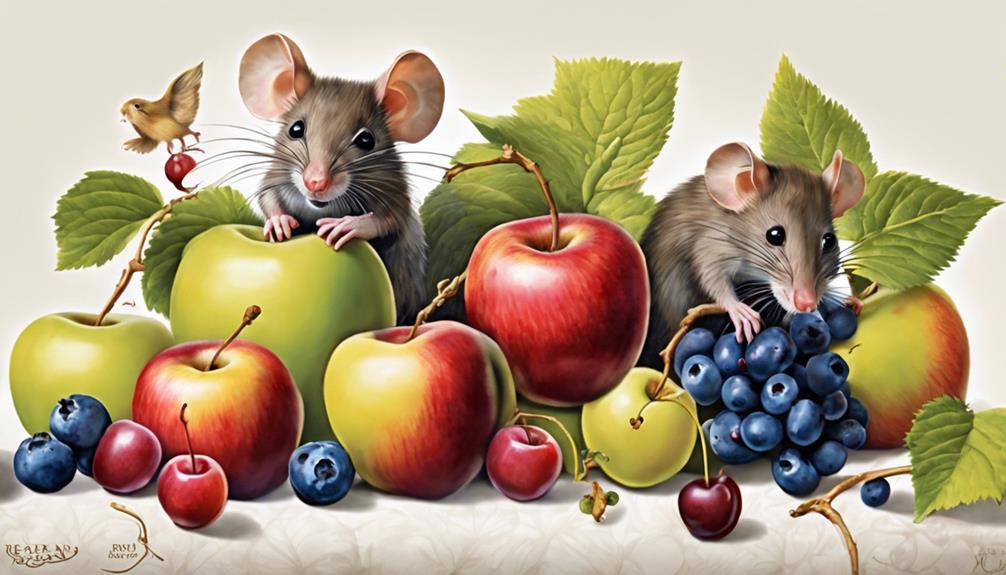
After discussing safe feeding practices for rats, it's important to consider alternative fruit options that provide a variety of nutrients for these small pets.
While cherries are a great source of vitamins and antioxidants for rats, there are other fruits that can also benefit their diet. Apples are rich in fiber and vitamin C, supporting a healthy gut for your rats. Bananas, high in potassium and easily digestible, make for a tasty treat. Pears, containing fiber and vitamin C, can be fed with or without the skin to add variety. Blueberries, packed with antioxidants and vitamin C, are safe for rats whether fresh or frozen.
It's important to note that fruits like apples, bananas, pears, and blueberries should be fed in moderation due to their natural sugar content. Remember to avoid feeding your rats cherry pits as they contain cyanide, which is toxic to them. By offering a mix of these fruits, you can ensure a balanced diet for your beloved rats.
Common Questions About Rats and Cherries
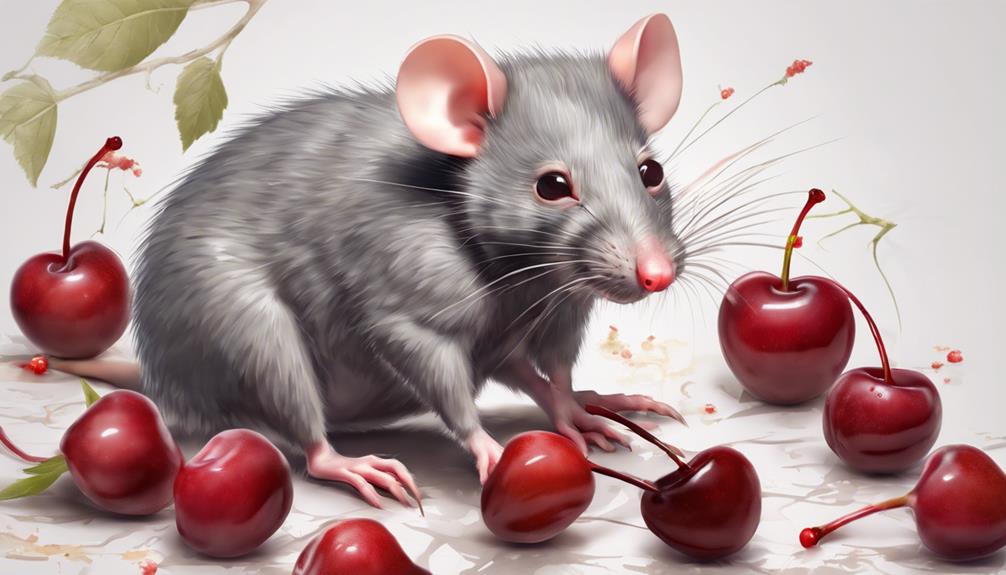
Let's delve into some common queries about rats and cherries to clarify any uncertainties pet owners may have regarding the safety and benefits of this fruit for their furry companions.
- Can rats eat cherries with pits? It's crucial to remove the pits before feeding cherries to rats, as they contain cyanide, which can be toxic to rats and lead to health problems.
- Are cherries healthy for rats? Cherries are a great source of fiber and antioxidants, making them a beneficial treat for rats when given in small amounts.
- How often can I feed cherries to my rats? Limit cherry consumption to one or two per week for adult rats to prevent any potential health issues associated with the high levels of sugar in fruits.
- What are the benefits of feeding cherries to rats? Feeding cherries in moderation can help boost rats' immune systems and contribute to their overall health and well-being.
Frequently Asked Questions
Can You Feed Rats Cherries?
Yes, we can feed rats cherries in moderation. Cherries without pits are safe, offering fiber benefits. Limit to one cherry per rat every other day.
Staining is normal around the mouth and paws. While cherries are a nice treat, they shouldn't replace the main diet.
Be mindful of cyanide risks from pits. Cherries can be a delightful addition to a rat's diet when given thoughtfully and in appropriate amounts.
What Is a Rats Favorite Fruit?
Our pet rats have diverse taste preferences when it comes to fruits. While some may gravitate towards apples, bananas, or berries, others might've a sweet tooth for cherries or strawberries.
In our experience, offering a variety of fruits is key to discovering each rat's favorite. Each rat has unique likes and dislikes, making it exciting to see which fruit they'll enjoy the most.
What Is Most Toxic to Rats?
Absolutely, the most toxic substance for rats is cyanide, which can be found in certain foods like cherry pits. For rats, ingesting cyanide can lead to severe health complications and even death.
It's crucial to be vigilant and ensure that any potential sources of cyanide, such as cherry pits, are kept far away from our furry friends.
Being aware and proactive about toxic substances is essential for safeguarding our rats' well-being.
What Fruits Do Rats Not Like?
We've noticed that rats may not be big fans of citrus fruits like oranges or grapefruits due to their strong taste.
Some rats might also steer clear of mangoes because of their messy texture.
Pineapples or papayas could be less appealing to rats because of their tropical flavors.
Additionally, kiwi fruit's tartness mightn't be a hit with certain rats.
Lastly, fruits with strong aromas like durian or jackfruit may not pique a rat's interest.
Is It Safe to Feed Rats Other Fruits and Vegetables Besides Cherries and Broccoli?
Yes, you can safely feed rats broccoli, but it’s important to give them a variety of fruits and vegetables in moderation. Rats can also enjoy fruits like apples, bananas, and strawberries, as well as veggies like carrots, lettuce, and peas. Just be mindful of their sugar and sodium intake.
Conclusion
In conclusion, cherries can be a tasty and nutritious treat for rats when fed in moderation and with caution. While they offer benefits like antioxidants and vitamins, there are also risks such as pits and high sugar content.
By following safe feeding practices and considering alternative fruit options, you can ensure your furry friends enjoy cherries safely. Keep your rats happy and healthy by treating them to a variety of fruits in their diet.
